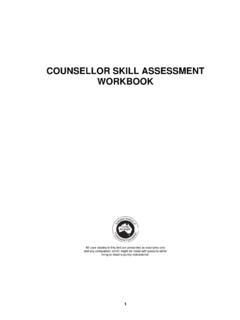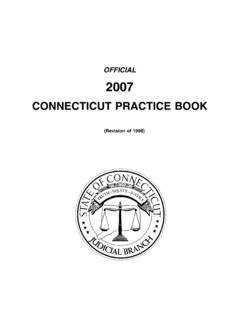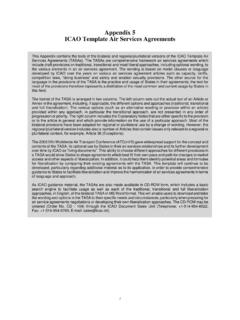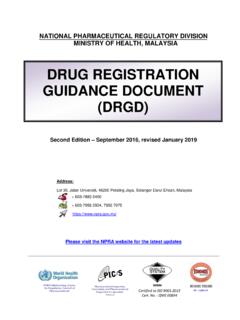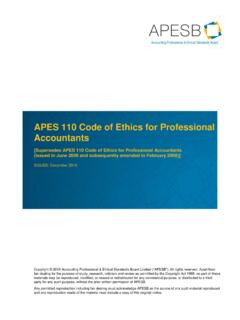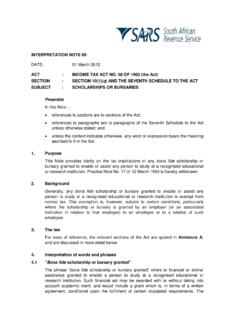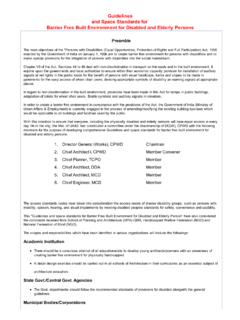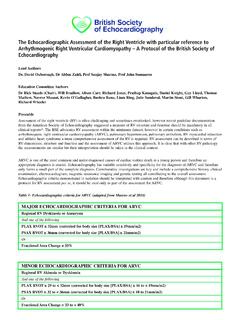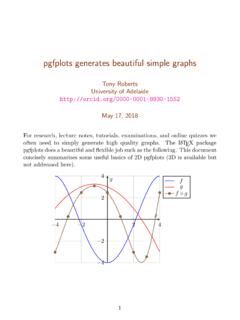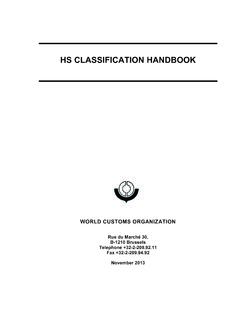Transcription of Code of Ethics and Practice
1 Australian Counselling Association PO Box 88, Grange Qld 4051 Phone: 1300 784 333 Website: Email: ABN: 122 427 11 378 Version 15 dated 18 March 2019 Code Of Ethics and Practice of the Australian Counselling Association The peak body for counsellors and psychotherapists in Australia. Version 15 dated 18 March 2019 2 Code of Ethics and Practice of the Association for Counsellors in Australia Table of Contents 4 Definitions .. 5 Code of Ethics .. 7 Code of Practice .. 7 Issues of Responsibility .. 8 Responsibility to the Client .. 8 (a) Client Safety .. 8 (b) Client Self-determination .. 8 (c) Breaks and Endings.
2 9 (d) Responsibility to other Counsellors .. 9 (e) Responsibility to Colleagues and Others .. 9 (f) Responsibility to the Wider Community Law .. 9 (g) Resolving Conflicts Between Ethical Priorities .. 10 Anti-Discriminatory Practice .. 10 (a) Client Respect .. 10 (b) Client Autonomy .. 10 (c) Counsellor Awareness .. 10 Confidentiality .. 10 Settings .. 11 Exceptional Circumstances .. 11 Management and Confidentiality .. 11 Contracts .. 12 (a) Advertising and Public Statements .. 12 (b) Pre-Counselling Information .. 12 (c) Contracting with 12 Version 15 dated 18 March 2019 3 Code of Ethics and Practice of the Association for Counsellors in Australia Boundaries.
3 12 (a) With Clients .. 12 (b) With Former Clients .. 13 Dual and Multiple Roles .. 13 Competence .. 13 The Counselling Environment .. 14 Committees .. 15 Equal Opportunities Policy Statement .. 15 Application of the Code .. 16 Version 15 dated 18 March 2019 4 Code of Ethics and Practice of the Association for Counsellors in Australia Preamble (a) The Australian Counselling Association (the ACA) has been established to; i) To provide an industry-based Association for persons engaged in counsellor education and Practice . ii) To monitor, maintain, set and improve professional standards in counsellor education and Practice .
4 Iii) To be a self-regulatory body to provide for registration of members and to provide a mechanism for dealing with complaints about members. iv) To liaise with Government for the benefit of members and the public. (b) Membership of the ACA (Inc) commits members to adhere to the ACA (Inc) Code of Ethics and Practice . The Code of Ethics and Practice applies to counsellors work related activities. It includes the clinical or counselling Practice as well as research, teaching, supervision of trainees and other activities that relate to the overall general training and employment of the counselling profession. (c) The Code of Ethics and Practice is intended to provide standards of profession conduct that can be applied by the ACA (Inc) and by other bodies that choose to adopt them in Australia.
5 Depending upon the circumstances, compliance or non-compliance with the Code of Ethics and Practice may be admissible in some legal proceedings. Version 15 dated 18 March 2019 5 Code of Ethics and Practice of the Association for Counsellors in Australia Definitions (a) The Association means the ACA (Inc) (b) Associated Party refers to any individual or organisation other than the client/s with whom the Counsellor interacts in the course of rendering a counselling service, this is inclusive of but not limited to: i. clients' relatives, friends, employees, employers, carers and guardians; ii. other professionals or experts; iii. Representative(s) from communities or organisations.
6 (c) Client means a party or parties to a counselling service involving counselling, supervising, teaching, research and professional Practice in counselling. Clients may be individuals, couples, families, groups of people, organisations, communities, facilitators, sponsors or those commissioning or paying for professional activity. (d) Code refers to this Code of Ethics and Practice (e) Counsellor refers to anyone delivering what a reasonable person would assume to be a counselling service (see below) (f) Counselling Service means any service provided by a counsellor to a client including but not limited to: i. Counselling activities ii. Professional activities iii.
7 Professional Practice iv. Research Practice v. Supervision vi. Teaching (g) Guidelines refer to these guidelines, any others issued by time to time by the ACA (Inc), the ACA (Inc) Code of Conduct, and the ACA (Inc) Complaints Policy and Procedural Guidelines (h) Legal Rights refer to those client rights protected under laws and statutes of the Commonwealth, State or Territory in which the Counsellor provides counselling services. Version 15 dated 18 March 2019 6 Code of Ethics and Practice of the Association for Counsellors in Australia (i) Member(s) means all those covered by the ACA (Inc) Code of Conduct. (j) Moral Rights refer to the universal human rights a defined by the United Nations Universal declaration of Human Rights that may or may not be protected by existing federal, State or Territory laws.
8 (k) Multiple Relationships occur when a counsellor, when providing a counselling service, also has been or is: i. In a non-professional relationship (sexual or otherwise) with the same client ii. In a different professional relationship with the same client iii. In a non-professional relationship with an associated party iv. A recipient of a service by the same client. (l) Practice refers to any act or omission by a Counsellor i. That another may reasonably consider to be part of a counselling service ii. Outside of that service that casts doubt upon their ability and competence to Practice as counsellors iii. Outside of their Practice of counselling which harms public trust in the discipline or the profession of counselling iv.
9 In their capacity as members of the Association (m) A Professional Relationship means the relationship between a counsellor and a client to whom he/she is delivering a counselling service. Version 15 dated 18 March 2019 7 Code of Ethics and Practice of the Association for Counsellors in Australia Code of Ethics (a) The helping relationship constitutes the effective and appropriate use of helper's skills that are for the benefit and safety of the client in his or her circumstances. Therefore, as members (regardless of level) of the Australian Counselling Association we will: i. Offer a non-judgmental professional service, free from discrimination, honouring the individuality of the client ii.
10 Establish the helping relationship in order to maintain the integrity and empowerment of the client without offering advice. iii. Be committed to ongoing personal and professional development iv. Ensure client understanding of the purpose, process and boundaries of the counselling relationship. v. Offer a promise of confidentiality and explain the limits of duty of care. vi. For the purpose of advocacy, receive written permission from the client before divulging any information or contacting other parties. vii. Endeavour to make suitable referral where competent service cannot be provided. viii. Undertake regular supervision and debriefing to develop skills, monitor performance and sustain professional accountability.
